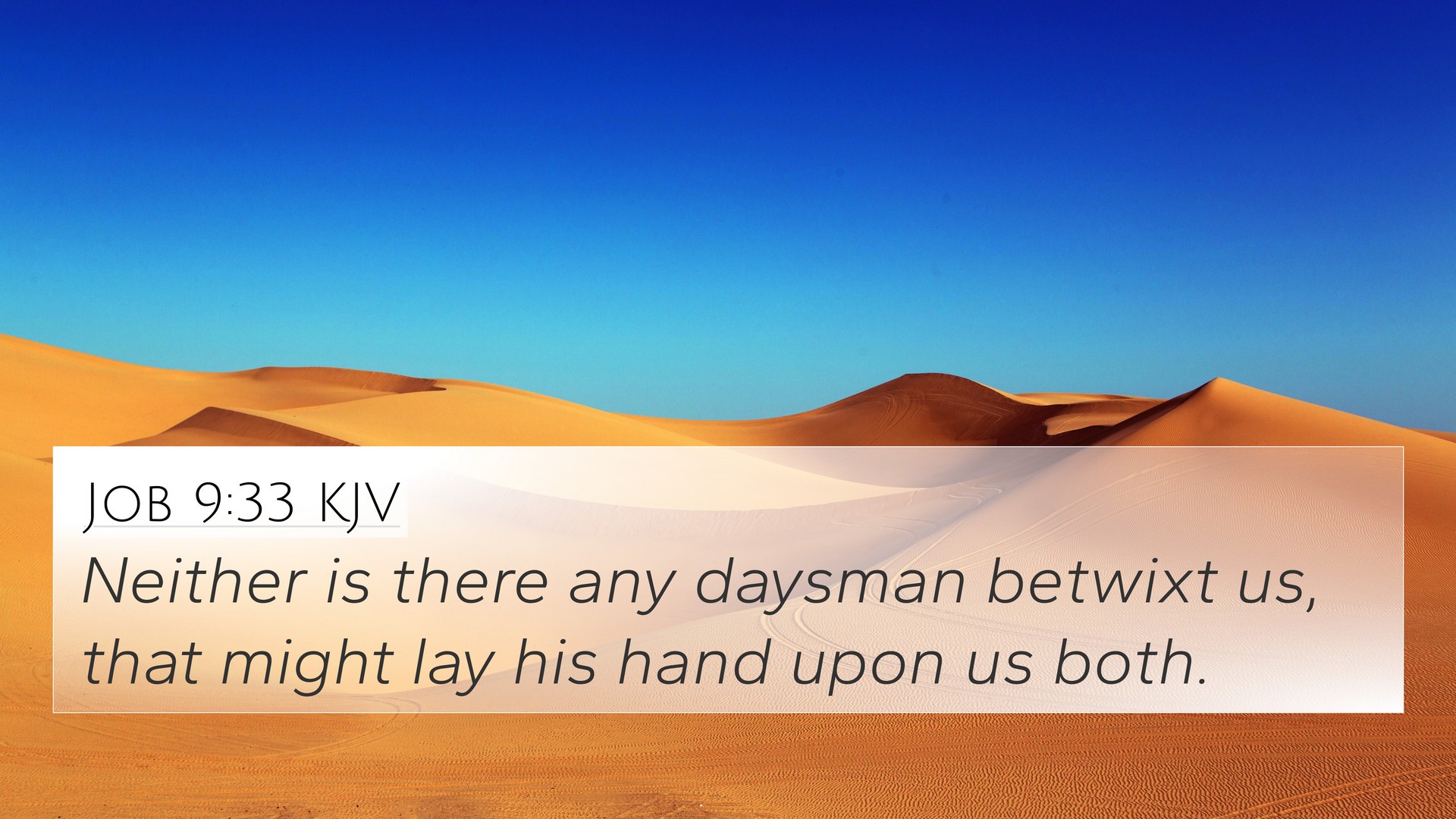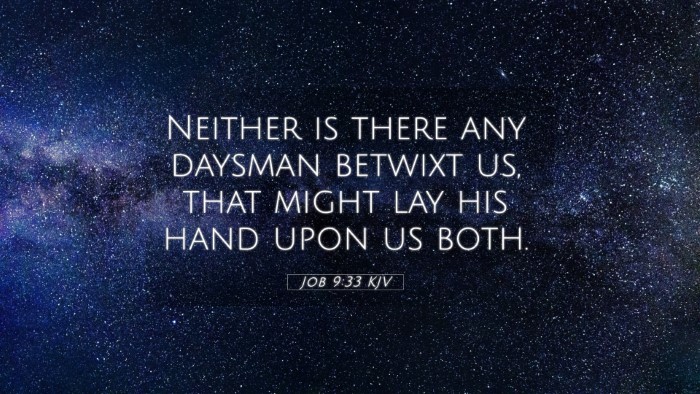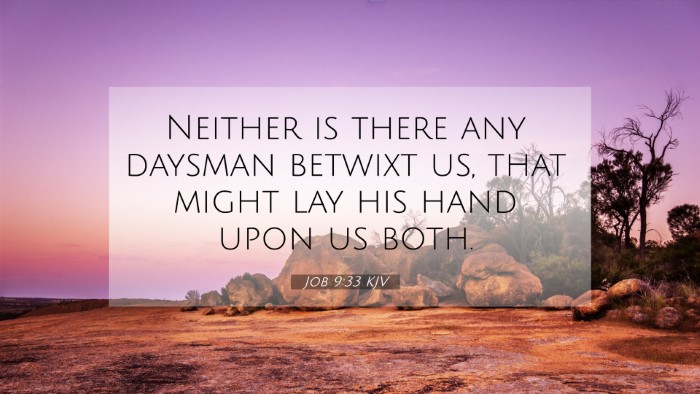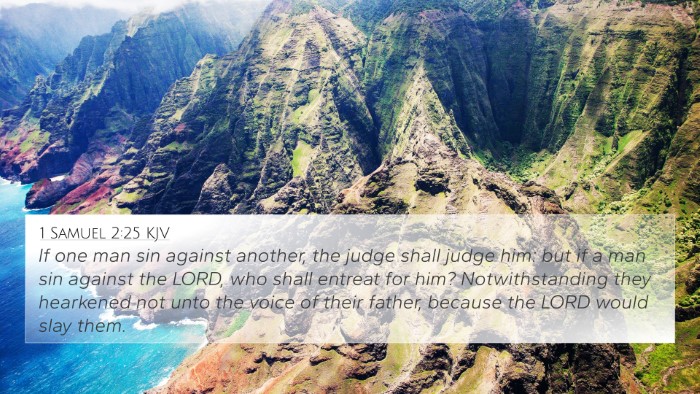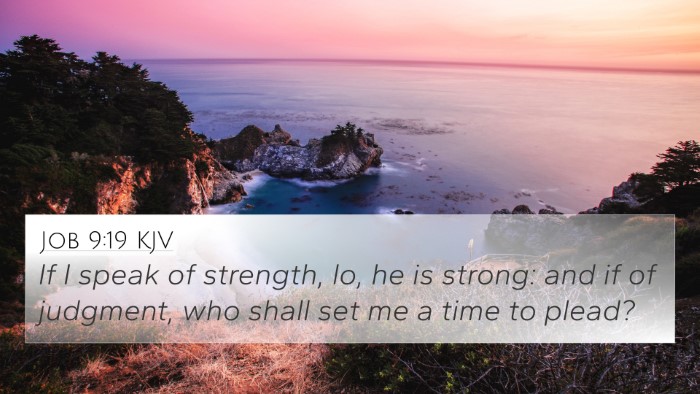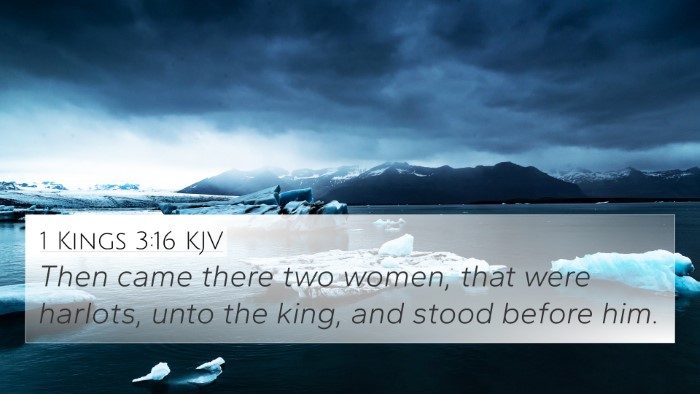Understanding Job 9:33
Job 9:33 states: "Neither is there any daysman betwixt us, that might lay his hand upon us both." This verse reflects Job's desire for an intermediary to mediate between himself and God during his time of suffering. In this summary, we will explore the meaning of this verse using insights from public domain commentaries such as those by Matthew Henry, Albert Barnes, and Adam Clarke.
Contextual Overview
The Book of Job addresses profound themes of suffering and divine justice. Job, a man of integrity, finds himself in great agony, questioning God about his circumstances. In this moment of despair, he expresses the need for a mediator, someone who can intercede on his behalf.
Commentary Insights
Matthew Henry
Matthew Henry emphasizes the absence of a "daysman"—a term that connotes an arbitrator or mediator. He highlights the desperation in Job's plea; Job feels isolated from God without someone to intercede. Henry explains that this longing for a mediator points to the necessity of Christ in the New Testament, who ultimately fulfills this role as our advocate before the Father.
Albert Barnes
Albert Barnes offers an interpretation that focuses on the legal context of a daysman. He notes that Job understands his own limitations and stands in need of a representative to confront God’s justice. Barnes discusses how Job’s sense of injustice drives his desire for someone to bridge the gap between human frailty and divine majesty, suggesting that this verse speaks to the broader human experience of seeking to resolve conflicts in our relationship with God.
Adam Clarke
Adam Clarke elaborates on the emotional aspect of Job's cry, explaining that the verse encapsulates Job's pain and yearning for understanding. Clarke posits that this absence of a daysman reflects Job’s feelings of abandonment and the idea that no human could adequately mediate with God on his behalf. Clarke further ties this to the redemptive work of Christ, who is our eternal mediator, making it clear that Job's plea foreshadows the need for divine intercession.
Bible Cross-References
- 1 Timothy 2:5: "For there is one God and one mediator between God and mankind, the man Christ Jesus."
- Hebrews 4:14-16: "Seeing then that we have a great high priest, that is passed into the heavens, Jesus the Son of God..."
- Romans 8:34: "It is Christ that died, yea rather, that is risen again, who is even at the right hand of God, who also maketh intercession for us."
- Job 16:21: "Oh that a man might plead with God, as a man pleadeth for his neighbor!"
- Isaiah 53:5: "But he was wounded for our transgressions, he was bruised for our iniquities..."
- Psalm mediator, representing our interests before God. This concept is central to understanding the nature of God’s relationship with humanity, particularly in times of distress.
- Hebrews 7:25: "Wherefore he is able also to save them to the uttermost that come unto God by him, seeing he ever liveth to make intercession for them."
Connecting Bible Verses
The plea for a mediator as expressed in Job 9:33 can be linked to several thematic and narrative connections within Scripture:
- Connection to Suffering: Job's suffering reflects the trials faced by many biblical figures, prompting deeper explorations of theodicy throughout the text.
- Intercessory Themes: The role of intercession is seen throughout the scriptures, drawing parallels with figures like Moses, who interceded for Israel.
- New Testament Fulfillment: The arrival of Christ as the definitive mediator showcases the continuity of God's plan throughout the Bible.
Thematic Bible Verse Connections
Understanding Job 9:33 from a thematic perspective involves recognizing its roots in the broader narrative of redemption and intercession woven throughout the Bible. The need for a mediator connects to key themes such as grace, justice, and mercy.
Supporting Verses
- Luke 22:32: "But I have prayed for you, Simon, that your faith may not fail."
- John 14:6: "Jesus answered, 'I am the way and the truth and the life. No one comes to the Father except through me.'
- Galatians 3:19: "Why then was the law given at all? It was added because of transgressions..."
- Exodus 32:11-14: Moses interceding for Israel reflects the human example of pleading before God on behalf of others.
Conclusion
Job 9:33 encapsulates a profound need for divine mediation during human suffering, a concept that is central to the Christian faith. This verse not only reflects Job's despair but also points to the larger biblical theme of God’s persistent desire to reach out to humanity through intermediaries. Through Christ, the ultimatedaysman, believers find solace and hope in recognizing that their pleas are heard and addressed through divine intercession.
Further Study: Tools for Bible Cross-Referencing
For those interested in exploring the connections between biblical texts further, utilizing tools for Bible cross-referencing can enhance understanding. Resources like a Bible concordance or a cross-reference Bible study guide are invaluable for identifying links and thematic parallels across Scripture.
